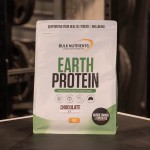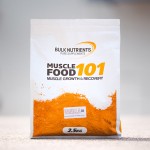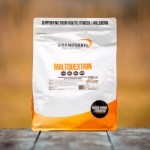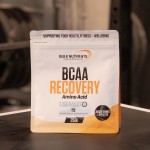How to Determine Calories for a Lean Bulk

Calories in vs calories out
In short, in order to put on muscle, you need to be consuming more calories than you are burning on a daily basis.
This is evident because when you are working out in the gym you are not putting on muscle, you are tearing away your muscle fibres. The other 23 hours of the day when you’re not training is when you are putting on muscle (Muscle Recovery).
In order for your muscles to grow, they need fuel (calories). The amount of calories required from person to person varies.
How to calculate your Basic Metabolic Rate (BMR)
In order to determine your maintenance calories, you first need to determine your Basic Metabolic Rate (BMR).
Your BMR is the amount of energy your body needs to survive, breathe and think. This can be determined using the Mifflin St. Jeor equation:
Men: BMR = 10 x weight (kg) + 6.25 x height (cm) – 5 x age (y) + 5
Women: BMR = 10 x weight (kg) + 6.25 x height (cm) – 5 x age (y) – 161
An example of calculating your Base Metabolic Rate (BMR)
Ben is 80kg, 185cm tall and 23 years old.
BMR = 10 x weight (80kg) + 6.25 x height (185cm) – 5 x age (23) + 5= 1846 calories.
How to calculate your total daily energy expenditure (calories)
Once you have worked out your BMR you can then use the Harris Benedict equation to calculate your total daily energy expenditure (calories).
Step 1
Pick the category that suits your activity level per week:
- Sedentary: 15 minutes or less of daily exercise (anything goes) with a desk job | 12
- Lightly Active: 1-2 hours of weights and/or cardio exercise per week | 13.5
- Moderately Active: 3-5 hours of weights and/or cardio exercise per week | 15
- Very Active: 6-7 hours of weights and/or cardio exercise per week | 16.5
- Extremely Active: 7+ hours of weights and/or cardio exercise per week | 17+
Step 2
Once you have this number simply multiply your body weight in kg by the category you picked.

An example of using the Harris Benedict equation
Ben is an 80kg male who goes to the gym for one hour, four times a week. He fits into the moderately active category.
Multiply 80kg by 15 = 1200 calories.

How to calculate your maintenance calories
Once you have your result from the Harris Benedict equation you can determine your maintenance calories.
Simply take your BMR, worked out above, and add your result from the Harris Benedict equation.
An example of calculating maintenance calories
Ben’s BMR is 1846 calories +1200 = 3046 is Ben’s maintenance calories.

How many calories over your maintenance do you need to lean bulk?
There are different approaches to putting on muscle. You can do what is known as a "Dirty Bulk" which is eating everything in sight, however, I recommend a "Lean Bulk". A lean bulk involves which is monitoring your macros to ensure you are gaining lean muscle tissue.
A good approach is to aim for 300-500 calories over your daily maintenance calories.
An example of calculating your total calorie needs
Ben requires a maintenance calorie intake of 3046 calories a day.
3046 + 300 = 3346. It's OK to round here to make your next calculations easier. In this case, we'll round up to 3350.
So Ben would have to consume a minimum of 3350 calories on a daily basis in order to be in a calorie surplus (consuming more calories than your body is burning per day).
How to calculate your macronutrient breakdown
Once you have your maintenance calorie intake number, you can work out what is known as your macronutrient breakdown. This will be breaking down 2800 calories into the three macronutrients:
- Protein (4 calories per gram)
- Carbohydrates (4 calories per gram)
- Fat (9 calories per gram)

Your macros: Protein
Protein is a key macronutrient that is a driver for muscle growth. In a study by Mannings (2011), he concluded that “a sedentary person needs to eat about 0.8g of protein per kg of body mass each day. Athletes, and people who want to build muscle, need about double this (1.2 – 1.7g of protein/kg of body mass).
I would suggest for males to go on to the higher end and females slightly less due to bone density and overall structure.
An example of calculating your protein nutrient breakdown
Ben is 80kg.
80kg x 1.7= 136 grams of protein required per day.
Calories for protein 136 x (4 calories) = 544 calories per day required.

Your macros: Fats
A good starting point for fat is between 0.15-0.25 of your daily calorie goal. Whether you want to be at 0.15 or 0.25 is a personal preference. If you are someone who puts on fat easily opt for 0.25. However, if you are someone who struggles to put on muscle go down to the lower range.
An example of calculating your fat nutrient breakdown
Let’s go in the middle here at 0.20 of the daily calorie goal.
Ben requires 3350 calories per day.
3350 calories divided by 5 = 670 calories.
As there are 9 calories in 1g of fat.
670 divided by 9 = 74g of fat.

Your macros: Carbohydrates
This is the body’s optimal energy source. There is a lot of negative thoughts about carbohydrates but when putting on muscle this macronutrient is essential.
The number of carbohydrates can now be worked out by adding the number of calories required from fat and protein.
An example of calculating your carbohydrate nutrient breakdown
First, we need to know his current total calories between protein and fat.
Ben's protein requirement is 544 calories and fat requirement is 670 calories
544 + 760 = 1214
Now to determine your carbohydrates, subtract the above number from the total calories required to put on muscle.
Ben's total calorie requirement is 3350.
3350 – 1214 = 2136 calories required from carbohydrates.
2136 divided by 4 = 534 grams of carbohydrates required each day.
Now, this number may seem high to many but people don’t realise that carbohydrates are your body’s number one source of energy.
Final macronutrient total for Ben
1. Protein = 136g
2. Carbohydrates = 536g
3. Fat = 74g
This should keep Ben in an optimal place to be building lean muscle.
Closing statements on a lean bulk
This is a basic guide to putting on lean size, which should be looked into instead of getting those unwanted fat gains.
Remember that gaining muscle is a long-term project and not something that can be simply switched on.
If you’re dedicated and diligent in your efforts, you’ll not be disappointed!
A weight range I would recommend to aim for through personal experience is 0.8kg-1kg per month gained.
One final note on carbohydrates
Having carbohydrates at the highest amount will make it a lot easier when the time comes to lose weight.
If you are sensitive to carbohydrates you can raise your fats and/or protein to suit, but experiment with this number first and adjust where necessary.
Just make sure these carbohydrates are mostly coming from complex carbohydrates being your (rice, oats, sweet potato and vegetables).

Featured Products
Looking for a different kind of cut? Check out these posts
Or check out our entire range of supplements for lean maintenance.
Ben Disseldorp
References:
- Douglas, C., Lawrence, J., Bush, N., Oster, R., Gower, B. and Darnell, B., 2007. Ability of the Harris-Benedict formula to predict energy requirements differs with weight history and ethnicity. Nutrition Research, [online] 27(4), pp.194-199. Available at: Ability of the Harris-Benedict formula to predict energy requirements differs with weight history and ethnicity.
- Mifflin, M., St Jeor, S., Hill, L., Scott, B., Daugherty, S. and Koh, Y., 1990. A new predictive equation for resting energy expenditure in healthy individuals. The American Journal of Clinical Nutrition, [online] 51(2), pp.241-247. Available at: A new predictive equation for resting energy expenditure in healthy individuals.
- Pain, C., 2020. Trying To Build Muscle? Here's What You Might Be Missing About Your Protein Intake - ABC Life. [online] Abc.net.au. Available at: Trying To Build Muscle? Here's What You Might Be Missing About Your Protein Intake.
















































